Spicy Gochujang Eggs: Perfect On Toast Or Rice
Spice up your breakfast routine with these creamy and spicy gochujang eggs served on toast. Perfect for two, this Korean-inspired dish is also great for dinner with rice and kimchi.
Spice up your breakfast with gochujang eggs. The Korean-inspired egg salad is a perfect breakfast for two when served on crusty sourdough toast. Or serve it any time of day with steamed rice and kimchi.
Gochujang paste, a spicy fermented Korean red pepper paste, is one of my all-time favourite pantry flavour boosters. It adds a unique umami flavour with a spicy kick. Mixed with creamy mayonnaise, a pinch of sugar, and nutty sesame oil, it makes a heavenly sauce for the perfect spicy egg salad.
Make a large batch of this gochujang egg salad for meal prep and enjoy it throughout the week.
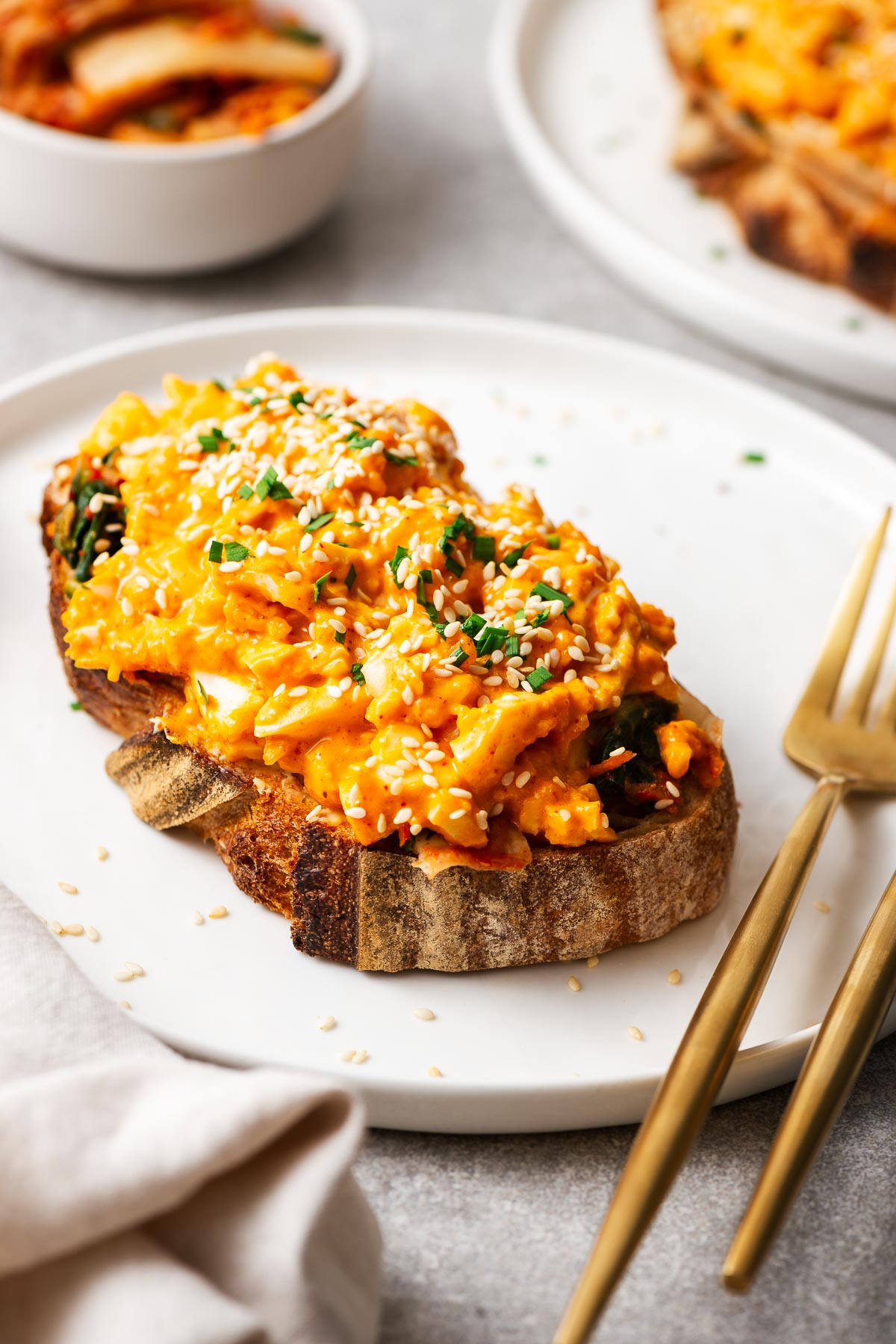
Why I love this recipe
- Flavour-packed: The creamy, umami-packed combination of gochujang paste, mayo, and sesame oil creates a flavourful sauce that perfectly coats the eggs.
- Versatile: Serve the gochujang eggs on toast for a quick and easy breakfast or on top of steamed rice for a light dinner. Simply add more toppings for a more substantial meal.
- Super quick & easy: With only five ingredients and a simple cooking process, this gochujang egg salad comes together in no time.
Ingredients and substitutes
You only need five ingredients for this Korean-style breakfast. It’s the perfect place to start if you’re new to Korean cuisine (and just as great if you’re a seasoned Korean flavour enthusiast)!
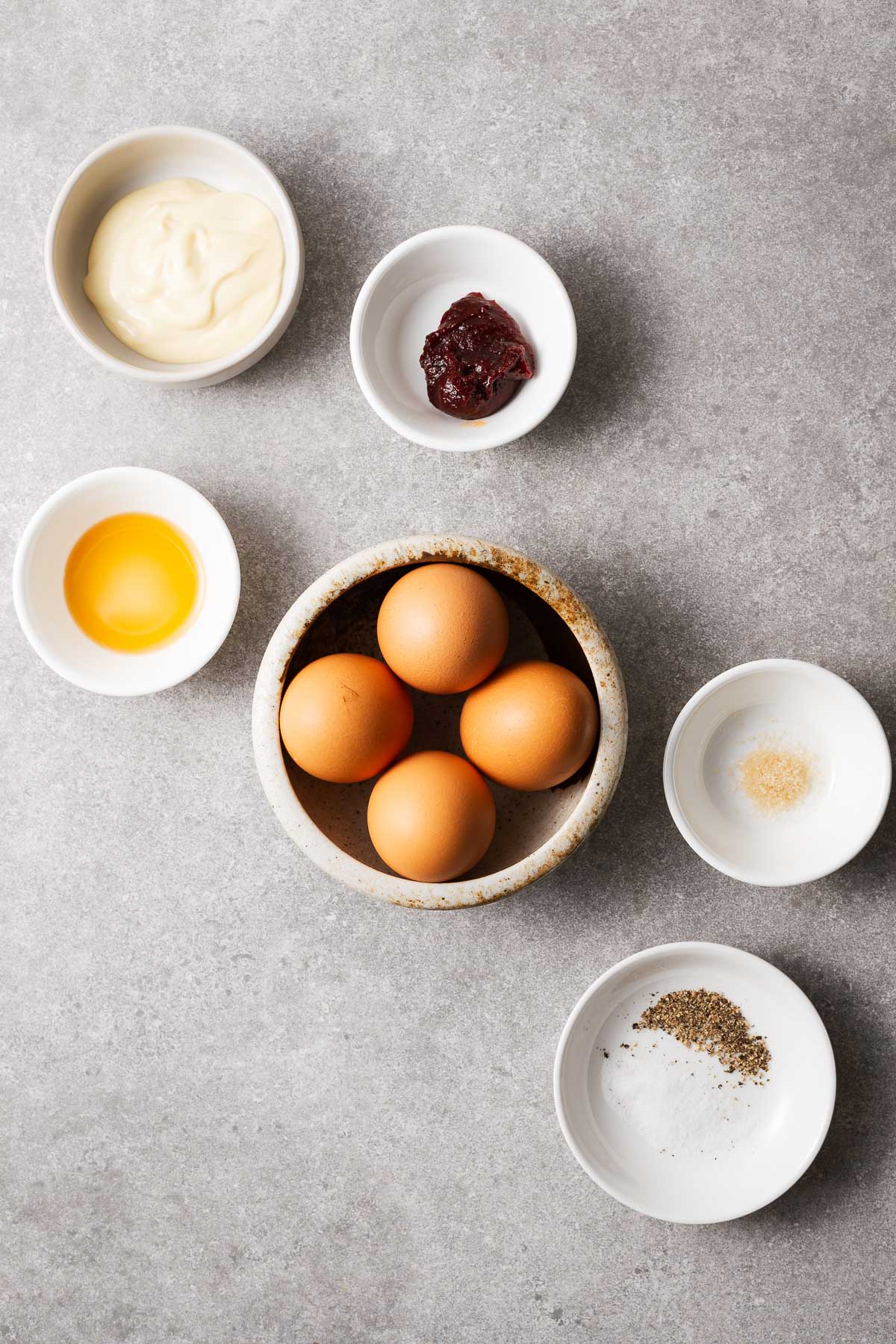
- Eggs: I typically use large pasture-raised eggs, use any eggs you prefer.
- Gochujang paste: The star of this egg salad show, gochujang paste, is a spicy, fermented Korean red pepper paste – it’s not the same as gochujang sauce (bibimbap sauce). Gochujang sauce is available in different levels of spiciness, so adjust the amount based on your preference. If you can’t find gochujang paste, try the recipe with Sriracha or a quick homemade gochujang substitute.
- Mayonnaise: I use regular mayonnaise, but you can also use kewpie mayo.
- Toasted sesame oil: It adds a nutty, savoury flavour and richness to the sauce.
- Brown sugar: I love a little pinch of sweetness to balance out the heat. But, you can omit it or use a different sweetener like honey or maple syrup.
- Salt and black pepper
How to make gochujang eggs
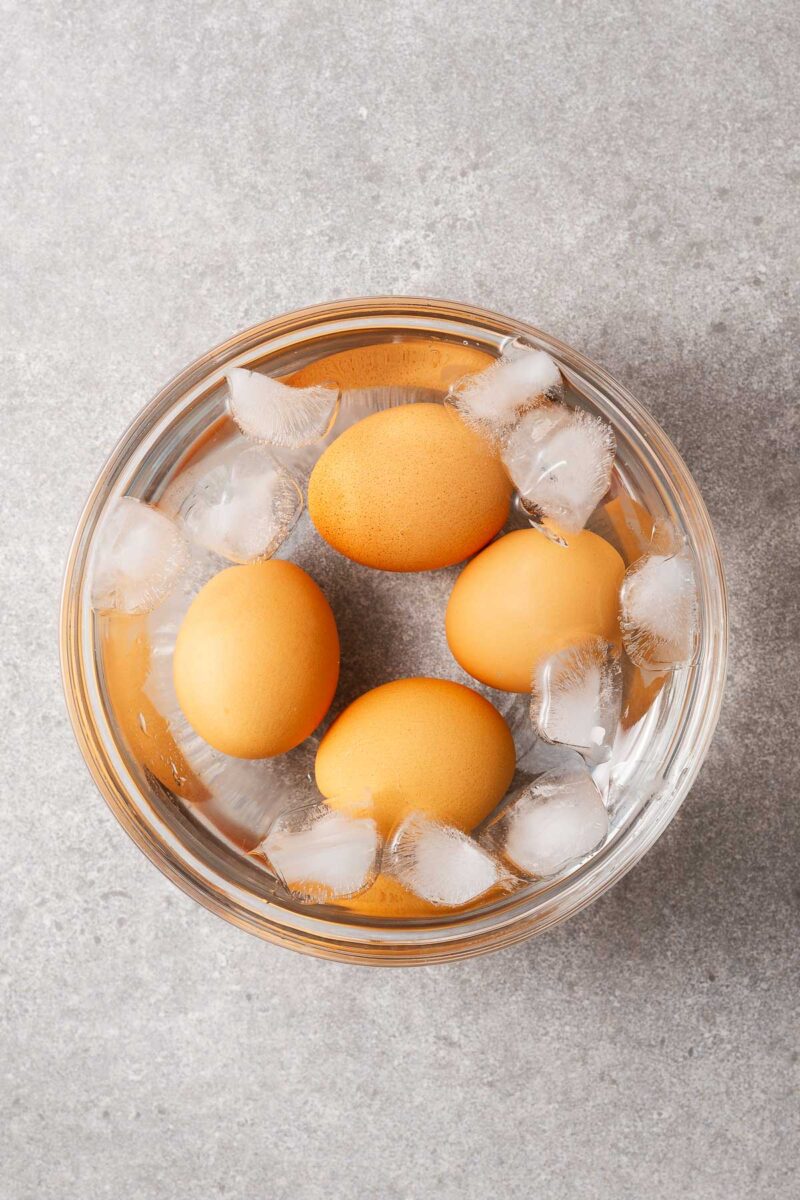
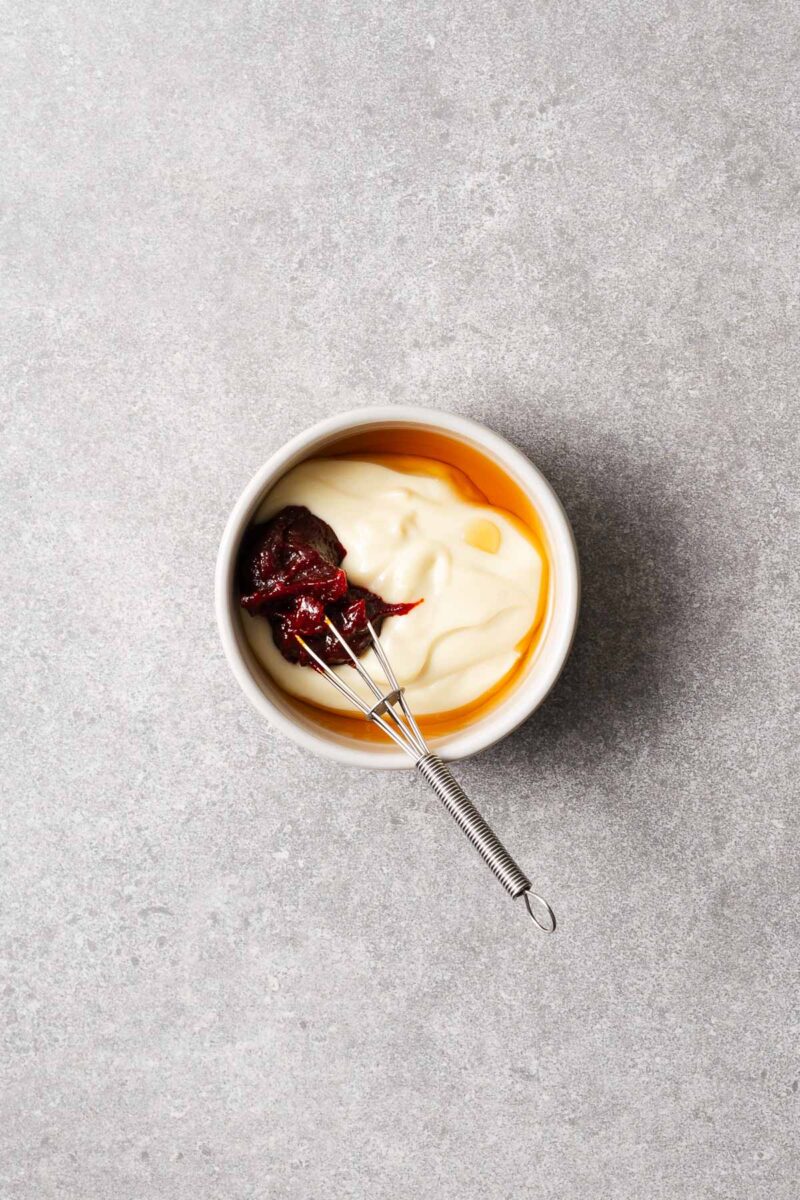
Step 1: Boil the eggs. Bring a pot of water to a boil. Carefully add the eggs and cook for seven and a half minutes. Then, immediately transfer to an ice bath to cool.
Step 2: Prepare the gochujang mayo. In a small bowl, mix together the gochujang mayo ingredients.
Tip: Why not make a large batch of gochujang mayo? It’s a super versatile sauce that goes with everything!
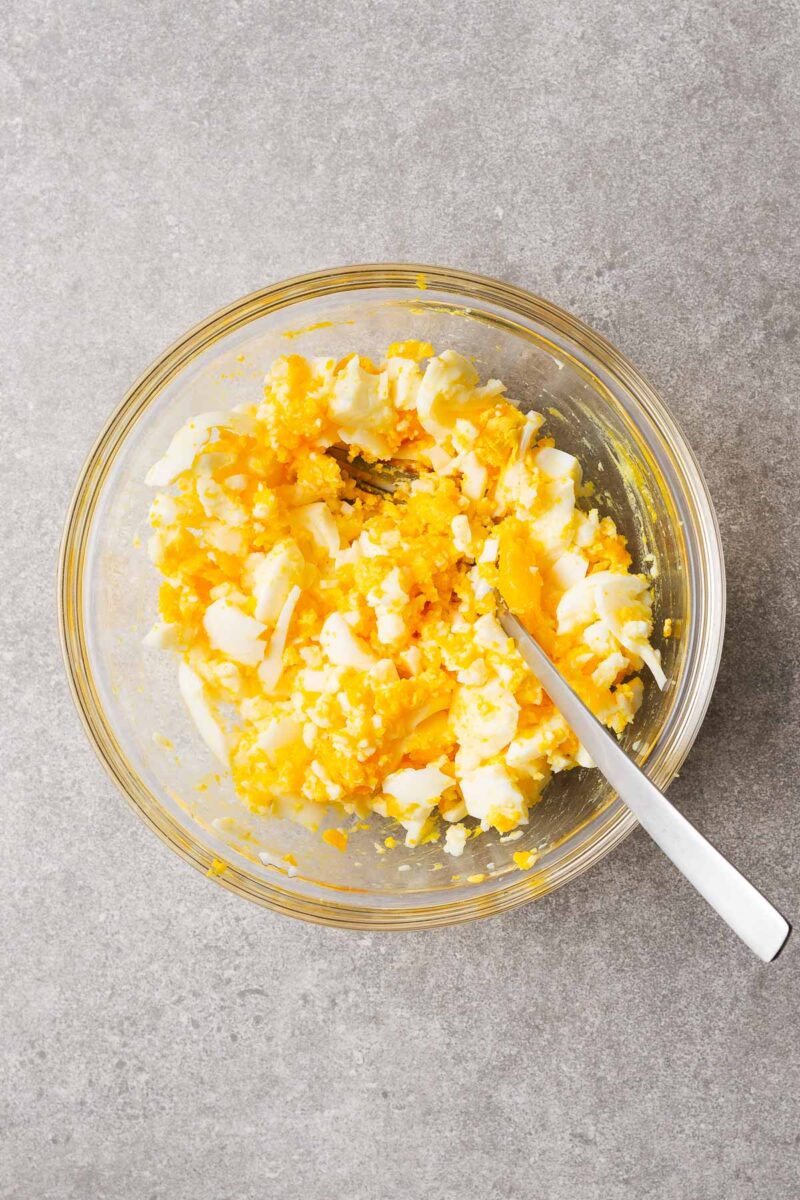

Step 3: Assemble the egg salad. Peel the cooled eggs and rinse off any remaining pieces of shell. Place the eggs in a medium bowl and mash them with a fork.
Step 4: Stir in the gochujang mayo mixture and season with salt and black pepper to taste.
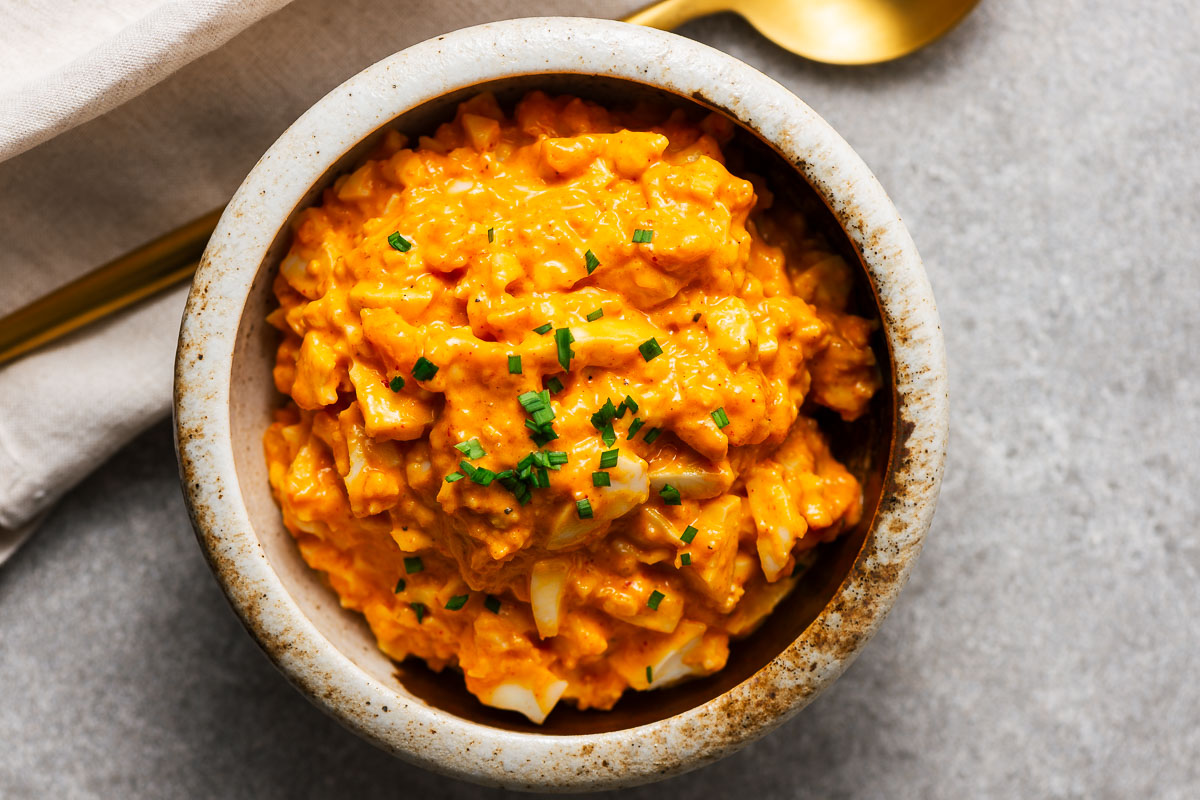
Storage
If meal prepping, make a double (or triple) batch of gochujang eggs and refrigerate it in an airtight container for up to three days. Enjoy them as a quick and easy breakfast or lunch.
Recipe variations
I seriously love eggs and gochujang paste. So, I eagerly underwent loads of recipe testing iterations to find my favourite gochujang egg recipe. So, if you’re not in the mood for gochujang egg mayo, you can also try the flavour combination with a few other methods:
- Scrambled eggs: Adding gochujang paste directly to scrambled eggs, was not my favourite. However, drizzling the gochujang mayo OVER scrambled eggs is utterly delicious! Try it with miso scrambled eggs for an umami-boosted breakfast.
- Poached eggs: Yup, you guessed it. The gochujang sauce mixture is delicious with poached eggs too. Think Korean-inspired eggs benedict where the still runny yolk combines with the creamy, spicy sauce.
- Fried eggs: Drizzle the sauce over Korean fried egg on rice (gyeran bap).
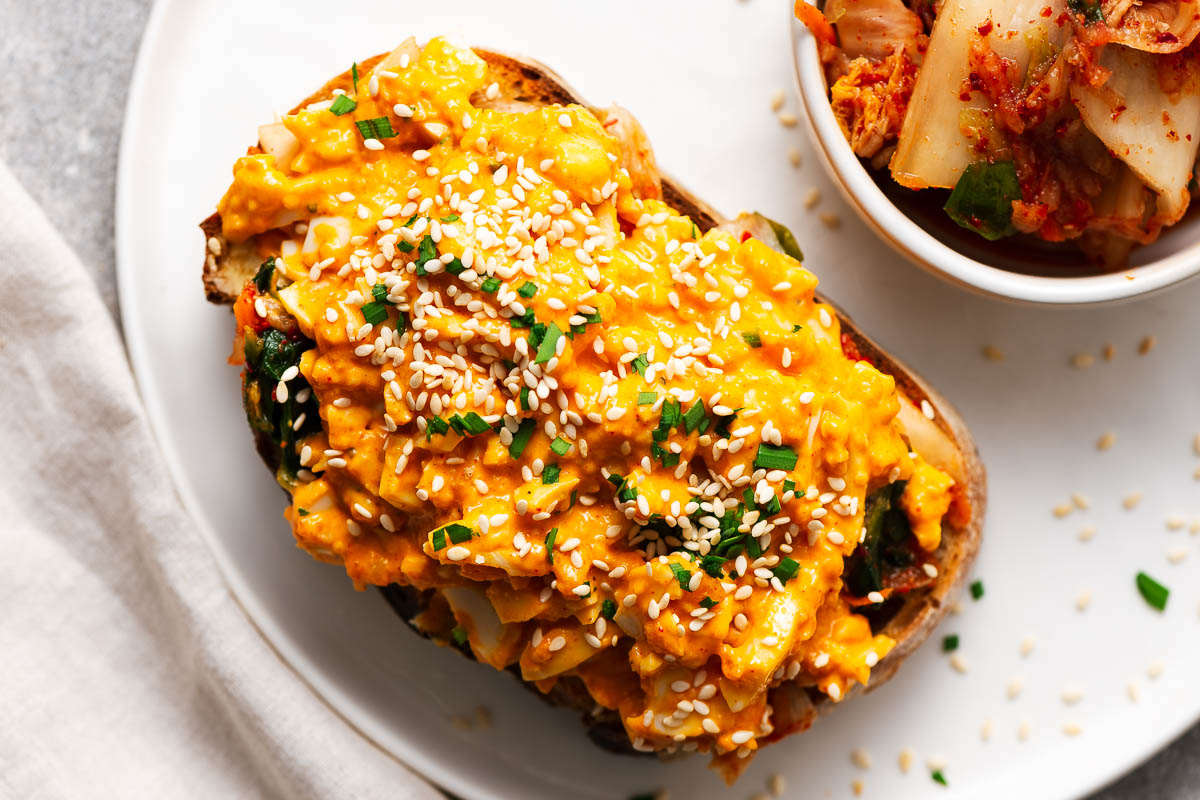
Serving suggestions
- On toast: Spoon the gochujang egg mixture on top of buttered sourdough toast for a hearty and satisfying breakfast. I love to add kimchi, toasted sesame seeds and chives. Avocado slices are also great!
- With rice: Gochujang eggs pair well with fried rice or steamed white rice and kimchi for a quick and easy dinner. Add a quick stir-fry with red bell pepper and minced garlic to complete the meal.
- As a side dish: Serve a bowl of gochujang egg salad with more Korean banchan (small dishes) like sesame broccoli, green onion salad and soy sauce braised potatoes.
- Spicy egg salad sando: Nestle the spicy egg mixture between two slices of soft bread for the ultimate egg sandwich.
- As an appetiser: Serve gochujang eggs with crackers or small bruschetta for the easiest appetiser or snack. Top with sliced red chilli pepper if you want it spicier!
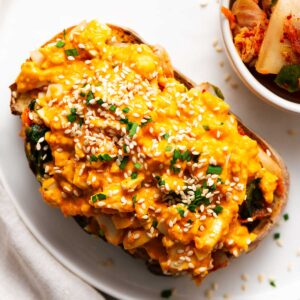
Ingredients
- 4 large eggs
- ½ tablespoon gochujang paste , more to taste*
- 2 tablespoons mayonnaise
- ½ teaspoon toasted sesame oil
- ¼ teaspoon brown sugar (optional)
- salt and freshly ground black pepper
To Serve (Optional)
- 2 thick slices of sourdough bread
- butter
- 4 tablespoons kimchi , roughly chopped
- 1 teaspoon toasted sesame seeds
- 1 teaspoon thinly sliced chives , or green onion (green parts only)
Instructions
- Bring a pot of water to a boil. Once boiling, carefully add the eggs. Cook for 7½ minutes*, then remove them from the pot and place them in an ice bath to cool down.
- Grab a small bowl and mix the gochujang paste, mayo, sesame oil and brown sugar (if using) until well combined. Taste and add more gochujang if you want it spicier – I always add another ½ tablespoon.
- Peel the cooled eggs and rinse off any remaining pieces of shell. Place the peeled eggs in a medium bowl and mash with a fork. Stir in the sauce mixture. Season to taste with salt and freshly ground black pepper – I add a ¼ teaspoon of salt.
To serve (optional serving suggestion)
- Toast crusty sourdough bread and spread it with butter. Divide the kimchi between the toast slices. Then spoon over the gochujang egg mayo and top with a sprinkling of toasted sesame seeds and chives or thinly sliced green onions.
Notes
- Gochujang paste is a spicy fermented Korean red pepper paste – not the same as gochujang sauce. It’s available in different levels of spiciness, so always adjust your gochujang paste to taste. You can always sprinkle some gochugaru (Korean chilli powder) or red pepper flakes for more heat.
- In this recipe, I like the eggs almost hard-boiled with the yolks still creamy but not runny. You can also opt for soft-boiled eggs with a runnier yolk (5 minutes), the egg mayo mixture will be more saucy and eggy. And if you’re not into creamy egg yolks, cook the eggs for up to 10 minutes.
- I love to serve gochujang eggs on toasted bread for a Korean-inspired breakfast, but you can just as easily serve it on steamed white rice for a main course rice bowl with some stir-fried veggies and more kimchi.
- Make a double batch of gochujang eggs for meal prep and refrigerate it in an airtight container for up to 3 days.




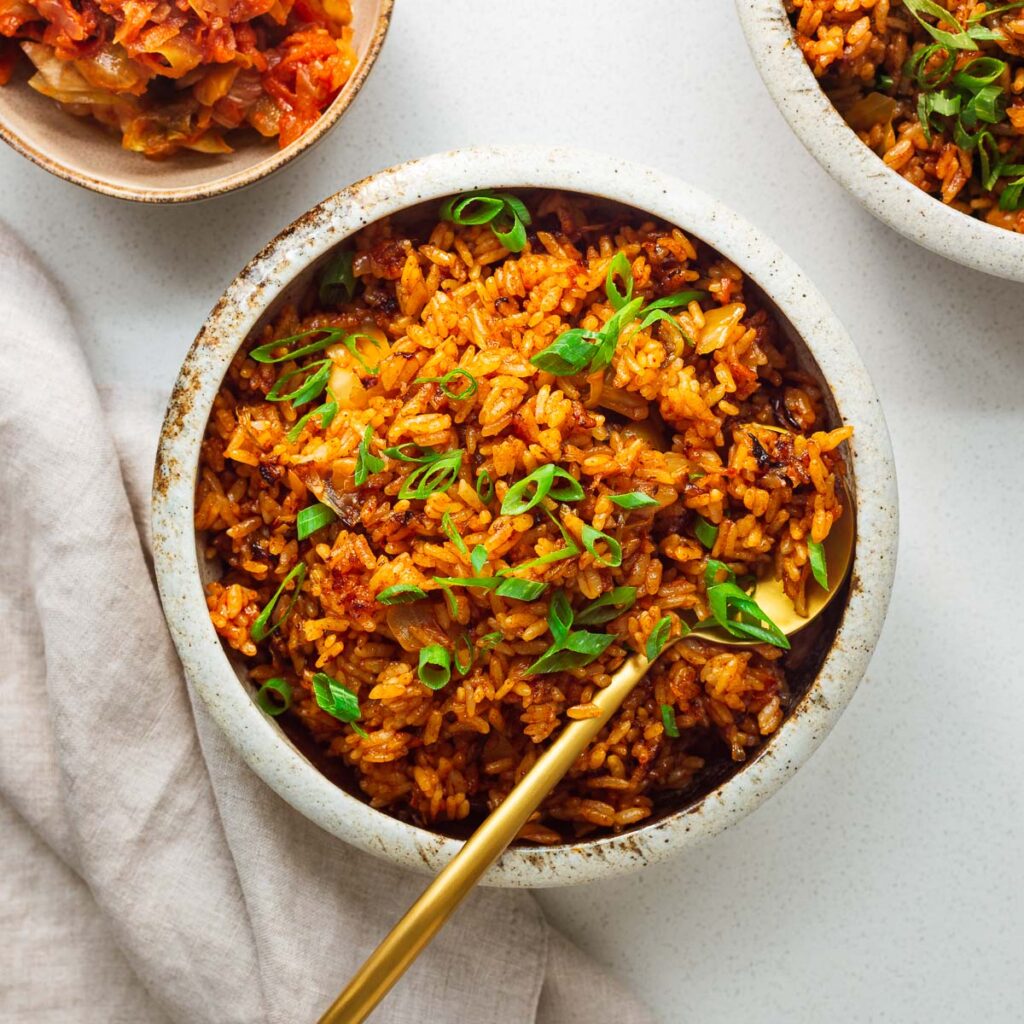
I love this recipe, will be trying this soon! thanks for sharing
You really should, Chara! It’s a delicious and easy breakfast!
This spicy toast was such a great breakfast! Something fun and different.
So happy you loved the spicy toast, Paula!
This might be my new favorite way to make eggs! They were spicy, creamy and totally delicious – and I enjoyed them on toast just like you suggested for breakfast!
I’m so happy you loved these eggs as much as I do, Anjali! I could honestly eat it everyday! 😂
Oh, wow! This looks amazing! I’ve never had gochujang eggs, but they look like a variation of egg salad, which is one of my favorite foods. I can’t wait to make these!
Yes, exactly that! It’s like egg salad with a spicy, umami twist from the gochujang. I make big batches for quick and easy breakfast, because it really is irresistible!